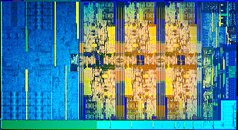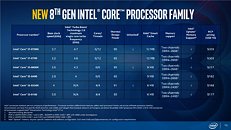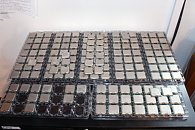Thursday, October 12th 2017
On Intel's Decision to no Longer Disclose All-core Turbo
Intel is no longer going to disclose all-core Turbo Boost speeds, starting with their 8th Gen Coffee Lake processors that have just been released. The information comes straight from the blue giant. Answering a query from ExtremeTech on the matter, the company said that "[W]e're no longer disclosing this level of detail as its proprietary to Intel. Intel only specifies processor frequencies for base and single-core Turbo in our processor marketing and technical collateral, such as ARK, and not the multi-core Turbo frequencies. We're aligning communications to be consistent. All Turbo frequencies are opportunistic given their dependency on system configuration and workloads."
This decision is a rollback that does little more than rob users of another data point that has really always been there. The practical effect of this change isn't anything to write home about: Intel's Turbo Boost capabilities were never guaranteed performance levels (the fact that the advertised Turbo speeds were called "Max Turbo" implied Turbo levels could be lower.) However, there's also not much that can be said to explain this change in stance from the blue giant. If anything, this decision only opens up debate and speculation regarding the reasons why Intel is making this change: and the skeptics among us will always default to foul play or dark linings.To our Forum dwellers: this piece is marked as an Editorial
For one, it could be said that Intel is doing this in order to unlock a lot more leeway in CPU binning. Absent all-core turbo speeds means that Intel now only has to guarantee two levels of performance for each of its chips: all-core base clocks (which for the 8700K, for example, is set at 3.7 GHz), and single-core Turbo (a more impressive 4.7 GHz). These are the only frequencies Intel now has to make sure all of their 8700K chips hit. This gives a whole new weight to the "silicon lottery" concept, in that now users can be saddled with the most basic 8700K that only achieves an all-core clock of just 3.7 GHz and not a switch more, or an amazing chip that hits 5.3 GHz easily.
Pore over Intel's ARK page, and now the 8700K processor is being listed as having a max Turbo frequency of 4.7 GHz - but that one frequency only really applies to single-core Turbo. So not only do Intel CPUs now look better to the unwary, distracted user (what, max 4.7 GHz on six cores, that's insane), but now there's also the chance of something like this happening: "So what if your unlocked K processor doesn't overclock a single MHz on all cores? We don't really specify it should be able to, do we?"To add to the confusion, it's also worth mentioning the "MultiCore Enhancement" option that most Intel motherboards ship with, which when enabled, overrides even Intel's previous maximum all-core Turbo Boost specs. Now, even if users and reviewers disable the option to find out what's Intel's rated (and now hidden) max Turbo Boost for any given processor, there's no guarantee that the frequencies achieved will be the same for all processors of the same product name. After all, different OC potential exists among chips according to die quality - and the fact that most motherboards now feature CPU voltages set on Auto should add to this scenario, with some CPUs requiring lower voltages to achieve higher clockspeeds than others, which theoretically, should mean different auto Turbo limits according to power consumption and thermal headroom. At the extreme of this situation, it might be impossible for reviewers to achieve parity on CPU reviews absent of disabling all-core Turbo features, since there won't be a baseline value they can consider: CPUs will be reviewed with all-core Turbos that are dependent on CPU quality and automated Turbo Boost. Unless all tech review sites agree on a globally accepted all-core Turbo speed, but that's slightly utopian, at the very least.Skepticism aside, the main issue here, I feel, is that the decision was made without any clear focus or mention as to why. Now yes, Intel might not have any shady reason for doing this - but nevertheless, there is a reason behind this decision; otherwise, the company just wouldn't make the move. All of the above scenarios are result of one thing only: the absence of clear communication, which ends up with users scratching their heads at a seemingly opaque decision.
Sources:
ExtremeTech, Intel ARK
This decision is a rollback that does little more than rob users of another data point that has really always been there. The practical effect of this change isn't anything to write home about: Intel's Turbo Boost capabilities were never guaranteed performance levels (the fact that the advertised Turbo speeds were called "Max Turbo" implied Turbo levels could be lower.) However, there's also not much that can be said to explain this change in stance from the blue giant. If anything, this decision only opens up debate and speculation regarding the reasons why Intel is making this change: and the skeptics among us will always default to foul play or dark linings.To our Forum dwellers: this piece is marked as an Editorial
For one, it could be said that Intel is doing this in order to unlock a lot more leeway in CPU binning. Absent all-core turbo speeds means that Intel now only has to guarantee two levels of performance for each of its chips: all-core base clocks (which for the 8700K, for example, is set at 3.7 GHz), and single-core Turbo (a more impressive 4.7 GHz). These are the only frequencies Intel now has to make sure all of their 8700K chips hit. This gives a whole new weight to the "silicon lottery" concept, in that now users can be saddled with the most basic 8700K that only achieves an all-core clock of just 3.7 GHz and not a switch more, or an amazing chip that hits 5.3 GHz easily.
Pore over Intel's ARK page, and now the 8700K processor is being listed as having a max Turbo frequency of 4.7 GHz - but that one frequency only really applies to single-core Turbo. So not only do Intel CPUs now look better to the unwary, distracted user (what, max 4.7 GHz on six cores, that's insane), but now there's also the chance of something like this happening: "So what if your unlocked K processor doesn't overclock a single MHz on all cores? We don't really specify it should be able to, do we?"To add to the confusion, it's also worth mentioning the "MultiCore Enhancement" option that most Intel motherboards ship with, which when enabled, overrides even Intel's previous maximum all-core Turbo Boost specs. Now, even if users and reviewers disable the option to find out what's Intel's rated (and now hidden) max Turbo Boost for any given processor, there's no guarantee that the frequencies achieved will be the same for all processors of the same product name. After all, different OC potential exists among chips according to die quality - and the fact that most motherboards now feature CPU voltages set on Auto should add to this scenario, with some CPUs requiring lower voltages to achieve higher clockspeeds than others, which theoretically, should mean different auto Turbo limits according to power consumption and thermal headroom. At the extreme of this situation, it might be impossible for reviewers to achieve parity on CPU reviews absent of disabling all-core Turbo features, since there won't be a baseline value they can consider: CPUs will be reviewed with all-core Turbos that are dependent on CPU quality and automated Turbo Boost. Unless all tech review sites agree on a globally accepted all-core Turbo speed, but that's slightly utopian, at the very least.Skepticism aside, the main issue here, I feel, is that the decision was made without any clear focus or mention as to why. Now yes, Intel might not have any shady reason for doing this - but nevertheless, there is a reason behind this decision; otherwise, the company just wouldn't make the move. All of the above scenarios are result of one thing only: the absence of clear communication, which ends up with users scratching their heads at a seemingly opaque decision.





89 Comments on On Intel's Decision to no Longer Disclose All-core Turbo
The reason why Intel is doing this is two-fold:
One, they can't guarantee clocks based on different systems people use (cooling, etc). That's what they said.
Two, they wan't people to think these CPUs are better than they are in reality, in average. They didn't lose a word about varying CPU quality. This is what I call deceptive behaviour.
If RyZen+ allows regular 4.2~4.5GHz OC it would be a serious game changer.
- Actually achieveable performance on non-K/non-overclockable Intel CPUs might largely depend on the motherboard model/manufacturer.
- With "core enhancement" features enabled under stock settings, overclocked CPUs are being tested against non-overclocked CPUs in reviews.
- CPUs getting overclocked means they could be exceeding their TDP by a large margin (GamersNexus saw +40% power usage from the 8700K), so not just the performance, the stated TDP too becomes misleading.
Otherwise we'd still be be using *86 CPUs, with * being the generation. Why do you think Intel got rid of 486 as soon as they realized they couldn't copyright it? "Pentium" couldn't come soon enough.
ARK: ark.intel.com/products/97129/Intel-Core-i7-7700K-Processor-8M-Cache-up-to-4_50-GHz
Turbo Boost Frequency Table: www.intel.com/content/www/us/en/support/articles/000005523/processors.html
Consumer with brain are more clever that you think.
but Intel and their legal team would Claim its the Information that's concerned is Copyrighted (and that would include the numbers)
So, what do we have? Locked processors that would not have the same performance across the board and the start of an era in graphics cards where things will be like the Intel platform, with more expensive UNlocked "X" models and cheaper Locked models. They both take advantage of AMD's inability to raise frequencies in both CPUs and GPUs.
Not sure turbo guarantees are part of it, that's up for debate, but this statement kind of rubbed me the wrong way. The nature of a commercial transaction is that the company does indeed owe you a product and services associated with it.
Question... how many flat earth people frequent this forum? Feels like it would be an inordinate amount.
I'm sure there are plenty more hiding somewhere.
And what does "fully unlocked" have to do with them showing or not showing boost tables???